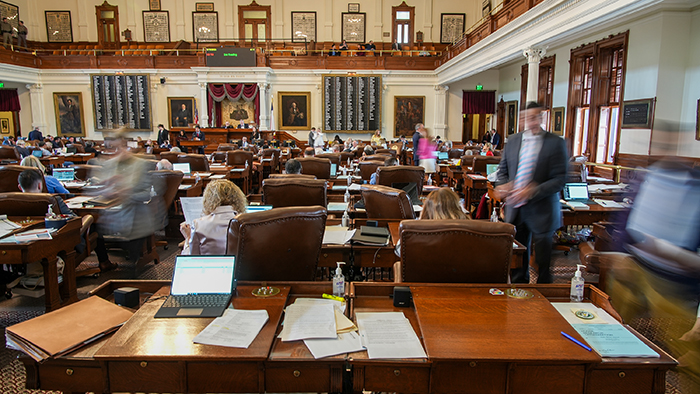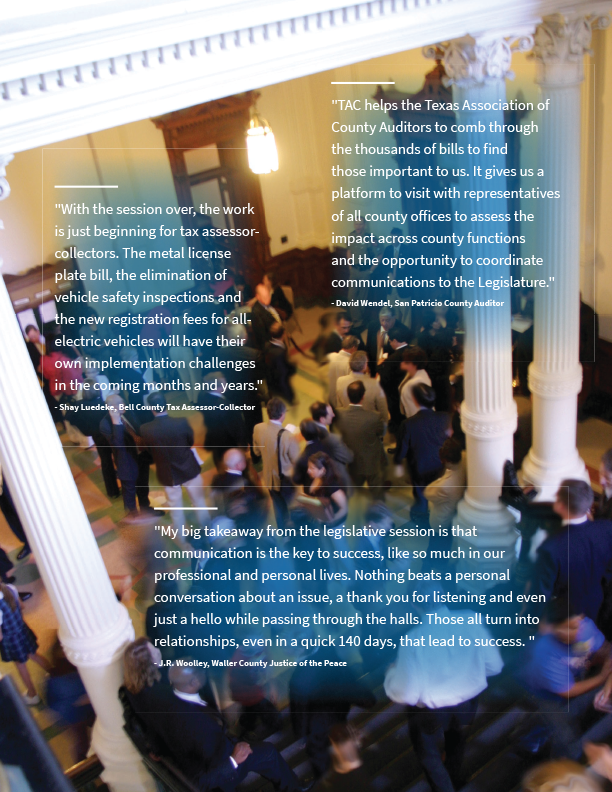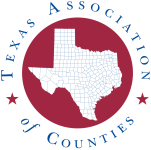County Magazine | July 31, 2023
Capitol Gains & Losses: A recap of the 88th Texas Legislature

The regular session of the 88th Legislature began Jan. 10 with attention focused on a record $32.7 billion budget surplus. It ended 140 days later, on the heels of the historic impeachment of Attorney General Ken Paxton by the Texas House and with strained relationships and acrimonious tweets underscoring the failure by lawmakers to deliver on property tax relief, a legislative priority of Gov. Greg Abbott, Lt. Gov. Dan Patrick and Speaker Dade Phelan.
Abbott responded by immediately calling the Legislature into special session. Amid the flaring tensions, Abbott also vetoed a near-record 76 bills, along with one line item in the two-year 2024-25 budget. The Governor tied some of the vetoes to the property tax impasse.
After lawmakers again failed to pass a property tax plan, Abbott promptly called a second special session on June 27. Two weeks later, Patrick and Phelan announced a compromise plan. The heart of the plan is in Senate Bill 2. It provides for the state to spend $12.7 billion to reduce local school property taxes for homeowners and business properties. It also increases the amount of that a home's taxable value is exempted from school property taxes from $40,000 to $100,000, or $110,000 for homeowners 65 and older or who have a disability.
The House and Senate passed the tax relief legislation and adjourned the second special session on July 13. Abbott was expected to sign the legislation into law, though he had not yet done so as of County magazine's print deadline. To take effect, SB 2 requires voters to approve an associated House joint resolution, HJR 2, on Nov. 7.
This fall, Abbott is expected to call a special session on school vouchers, another of his priorities left hanging at the end of the regular session. Opposition to vouchers among lawmakers representing rural school districts has proved steadfast thus far.
As if that weren't enough drama to come, the Senate will decide the impeached Paxton's fate starting Sept. 5.

County priorities gain ground
Even before the regular session entered the history books, counties had already begun to absorb what had been wrought. The Texas Association of Counties' Legislative Services department and members of county official associations tracked thousands of bills affecting county government during the regular session.
"We are very grateful for our county members who worked so closely with our team to stay engaged on issues affecting counties throughout the legislative session," said Noe Barrios, Director of Legislative Services. "The diligent efforts to respectfully convey the county perspective on thousands of bills had a positive impact even if it didn't always go our way."
TAC kept its members on top of the latest developments through its weekly Tuesday Morning Breakfast meetings, "TAC on the Lege" video series, County Issues newsletter and Texas County Voice podcast. County officials remained engaged throughout the session to voice the concerns of local government and local needs. They worked to shape bills as they were being written by testifying in committee, reaching out to their senators and representatives and working with their county colleagues to create consensus where needed on proposed legislation.
"The 88th regular session will go down in the history books for a multitude of reasons, but for me, it's one I'm most proud of," Comal County Criminal District Attorney Jennifer Tharp said. "We were organized, educated members who testified, provided language, put in the long hours and guided bills through committees to the floors to the Governor's desk for signature.
"In this session, we weren't just DAs, Sheriffs or Auditors, but a collective voice for the county perspective," she said.
County officials' hard work succeeded in shaping bills beneficial to counties. For example, new legislation provides state funding so counties with populations of less than 300,000 can increase law enforcement salaries and meet the staffing needs of sheriffs, constables and prosecutors. This population threshold includes 236 counties and 295 district and county prosecutor offices.
The Legislature also agreed to better compensate counties for the cost of confining in county jails defendants awaiting transfer to a mental health facility or prison and juvenile defendants awaiting transfer to the custody of the Texas Department of Juvenile Justice. Lawmakers also allocated $1.5 billion to expand broadband internet access and $1 billion to help counties and other political subdivisions develop water supply projects and upgrade water infrastructure.
The water and broadband allocations depend on voter approval in November of proposed constitutional amendments authorizing the spending.


TAC's Core Legislative Group empowers county officials
Resource helps county officials interested in the legislative process amplify their influence at the Capitol and forge valuable connections.
The Core Legislative Group (CLG) was hard at work during the past legislative session, testifying in front of House and Senate committees and reaching out to state lawmakers to provide crucial information on legislation important to county officials.
To kick off the legislative session, CLG hosted a statewide virtual event to train members on the legislative process and offer tips for effective communication with legislators. Throughout the session, CLG played an active role in events such as Counties at the Capitol Legislative Day in February and County Government Day in April.
On County Government Day, CLG members went above and beyond by serving delicious Louie Mueller BBQ to hundreds of guests, including legislators and their staff members.
The remarkable efforts of CLG were felt throughout the Capitol, resulting in legislators and staffers gaining greater insight into county-related issues and fostering stronger relationships. Looking ahead, CLG has planned a series of virtual statewide events during the summer and fall, encompassing training, education and networking.
If you are a county official interested in becoming a part the Core Legislative Group, please contact Kelsey Bernstein at CLG@county.org to get registered. All CLG members are invited to an exclusive event at the Texas Association of Counties' 2023 Legislative Conference on Aug. 30. This networking gathering will feature inspiring stories by CLG members about their successes and challenges during the legislative session.
Struggles shadow county successes
County officials also succeeded, yet again, in helping to defeat another attempt to prohibit local governments from using public money to represent their interests at the Capitol. The latest effort to make it harder for local officials to effectively participate in the state policymaking process fits within a larger trend over the past several sessions to erode local control.
"As expected, the 88th regular legislative session required vigilant attention by county officials," Swisher County Judge Harold Keeter, president of the County Judges and Commissioners Association of Texas, said. "We were able to defeat efforts to silence county officials and their associations. For the first time in 30 years, counties will be reimbursed for the cost of holding state inmates.
"The excellent work by TAC, the County Judges and Commissioners Association and other associations was vital to these and other successes," he said.
There were setbacks, however. Preemption – the expansion of state control over areas traditionally delegated to local governments – emerged as a major theme of the session. A broad preemption law, House Bill 2127 by Rep. Dustin Burrows (R-Lubbock), prohibits counties and cities from enacting rules that conflict with or exceed state law. Exactly how HB 2127 will manifest itself is an open question, largely due to its reliance on private lawsuits for enforcement, but the impact on local governments is expected to be significant.
And despite their best efforts, county treasurers and their allies were unable to stop House Joint Resolution 134. The proposed constitutional amendment will abolish the office of county treasurer in Galveston County if approved by voters in November.
Most new laws take effect Sept. 1. Rest assured, TAC's Legislative Services team will be monitoring and reporting on developments to keep county officials informed and engaged.
Get in-depth analysis of 88th Legislature with TAC's Legislative Conference
The Texas Association of Counties' 2023 Legislative Conference will take an in-depth look at what happened during the 88th Legislature from Aug. 30 to Sept. 1 in Austin. Hundreds of county officials are registered to join state officials, lawmakers, subject matter experts and their colleagues from across the state to discuss the biggest issues facing Texas counties.
Texas Secretary of State Jane Nelson will deliver the keynote address during the conference's opening session on Wednesday, Aug. 30. Ten breakout sessions moderated by members of TAC's Legislative Services are set for Thursday, Aug. 31. Topics include property taxes, elections, broadband funding, federal and state grant funding for counties and investments in water infrastructure.
The conference will wrap up Friday, Sept. 1, with a look at the Legislature's continuing efforts to erode local control.
For the full conference agenda and to register to attend either in person or virtually, visit www.county.org/legeconference.
Details? TAC's Legislative Analysis Report has them
A list of several major county-relevant bills accompanies this article. For a more comprehensive list, see TAC's 2023 Legislative Analysis Report at www.county.org/LAR.
The report summarizes newly enacted and signed laws that affect county government and county operations. It also distills the 2024-25 state budget into a more concise version reflecting budget areas and programs of interest to counties.
Major county-related legislation
The Texas Association of Counties' 2023 Legislative Analysis Report summarizes significant county-related bills that passed during the 88th Legislature. Here are 10 major ones.
For more, visit www.county.org/legislative.
House Bill 9 by Rep. Trent Ashby (R-Lufkin)
Relating to the development and funding of broadband and telecommunications services.
Takes effect Jan. 1 if voters approve House Joint Resolution 125 on Nov. 7. HJR 125 is a proposed constitutional amendment that would create the Broadband Infrastructure Fund to expand highspeed internet access and assist in the financing of connectivity projects.
Another bill relating to broadband development, Senate Bill 1238 by Sen. Robert Nichols (R-Jacksonville), took effect upon being signed by Gov. Greg Abbott on June 2.
House Bill 17 by Rep. David Cook (R-Mansfield)
Relating to official misconduct by and removal of prosecuting attorneys.
Takes effect Sept. 1.
House Bill 718 by Rep. Craig Goldman (R-Fort Worth)
Relating to the issuance of certain tags, permits and license plates authorizing the movement of vehicles and the transfer and renewal of certain license plates.
Takes effect July 1, 2025.
House Bill 2127 by Rep. Dustin Burrows (R-Lubbock)
Relating to state preemption of and the effect of certain state or federal laws on certain municipal and county regulation.
Takes effect Sept. 1.
House Bill 2183 by Rep. Lynn Stucky (R-Denton)
Relating to the temporary appointment of county jailers.
Takes effect Sept. 1.
House Bill 2620 by Rep. Charlie Geren (R-Fort Worth)
Relating to the confinement in a county jail of a person pending a transfer to the Texas Department of Criminal Justice and to compensation to a county for certain costs of confinement.
Took effect upon being signed by Gov. Abbott on June 18.
House Bill 3474 by Rep. Jeff Leach (R-Plano)
Relating to the operation and administration of and practices and procedures regarding proceedings in the judicial branch of state government, including the service of process and delivery of documents related to the proceedings, the administration of oaths, and the management of the Texas Indigent Defense Commission, and the composition of certain juvenile boards; establishing a civil penalty; increasing certain court costs; authorizing fees.
Most of this omnibus judicial bill takes effect Sept. 1. One article of HB 3474 took effect upon being signed by Gov. Abbott on June 13; several sections take effect Oct. 1, 2023; Oct. 1, 2024; or Oct. 1, 2025.
House
Joint Resolution 134 by Rep. Greg Bonnen (R-Friendswood)
A proposed constitutional amendment that will abolish the office of county treasurer in Galveston County if voters statewide approve the measure on Nov. 7.
Senate Bill 22 by Sen. Drew Springer (R-Muenster)
Relating to the establishment of grant programs to provide financial assistance to qualified sheriff's offices, constable's offices and prosecutor's offices in rural counties.
Takes effect Sept. 1.
Senate Bill 28 by Sen. Charles Perry (R-Lubbock)
Relating to financial assistance provided and programs administered by the Texas Water Development Board.
Mostly takes effect Sept. 1. However, one section takes effect Jan. 1 if voters approve Senate Joint Resolution 75 on Nov. 7. SJR 75 is a proposed constitutional amendment that would create the Texas Water Fund to assist in financing water projects.
Senate Bill 1677 by Sen. Charles Perry (R-Lubbock)
Relating to the establishment and administration of Health and Human Services Commission programs providing mental health services to certain individuals in this state.
Takes effect Sept. 1.

